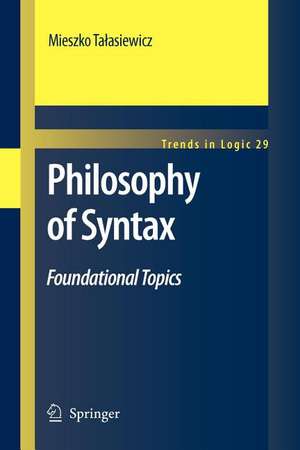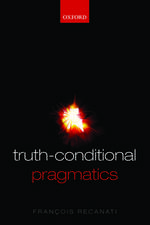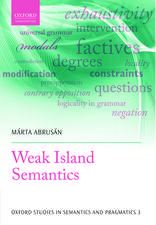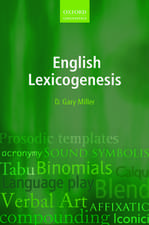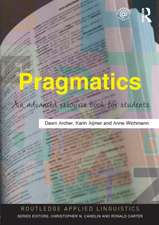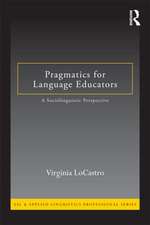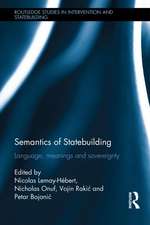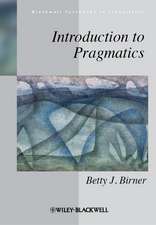Philosophy of Syntax: Foundational Topics: Trends in Logic, cartea 29
Autor Mieszko Talasiewiczen Limba Engleză Paperback – 14 mar 2012
| Toate formatele și edițiile | Preț | Express |
|---|---|---|
| Paperback (1) | 635.47 lei 6-8 săpt. | |
| SPRINGER NETHERLANDS – 14 mar 2012 | 635.47 lei 6-8 săpt. | |
| Hardback (1) | 641.71 lei 6-8 săpt. | |
| SPRINGER NETHERLANDS – 10 dec 2009 | 641.71 lei 6-8 săpt. |
Din seria Trends in Logic
-
 Preț: 365.82 lei
Preț: 365.82 lei -
 Preț: 361.12 lei
Preț: 361.12 lei - 18%
 Preț: 1225.48 lei
Preț: 1225.48 lei - 18%
 Preț: 959.50 lei
Preț: 959.50 lei - 15%
 Preț: 646.94 lei
Preț: 646.94 lei - 15%
 Preț: 636.27 lei
Preț: 636.27 lei - 18%
 Preț: 1387.73 lei
Preț: 1387.73 lei - 15%
 Preț: 644.82 lei
Preț: 644.82 lei - 15%
 Preț: 646.75 lei
Preț: 646.75 lei - 15%
 Preț: 636.12 lei
Preț: 636.12 lei - 15%
 Preț: 647.40 lei
Preț: 647.40 lei - 15%
 Preț: 641.03 lei
Preț: 641.03 lei - 18%
 Preț: 733.03 lei
Preț: 733.03 lei -
 Preț: 385.47 lei
Preț: 385.47 lei - 18%
 Preț: 960.42 lei
Preț: 960.42 lei - 18%
 Preț: 956.18 lei
Preț: 956.18 lei - 18%
 Preț: 952.09 lei
Preț: 952.09 lei - 20%
 Preț: 1276.86 lei
Preț: 1276.86 lei - 18%
 Preț: 951.14 lei
Preț: 951.14 lei - 15%
 Preț: 643.00 lei
Preț: 643.00 lei - 15%
 Preț: 644.49 lei
Preț: 644.49 lei - 18%
 Preț: 1845.48 lei
Preț: 1845.48 lei - 18%
 Preț: 953.65 lei
Preț: 953.65 lei - 18%
 Preț: 894.79 lei
Preț: 894.79 lei - 24%
 Preț: 1205.43 lei
Preț: 1205.43 lei - 15%
 Preț: 635.80 lei
Preț: 635.80 lei
Preț: 635.47 lei
Preț vechi: 747.61 lei
-15% Nou
Puncte Express: 953
Preț estimativ în valută:
121.61€ • 132.05$ • 102.15£
121.61€ • 132.05$ • 102.15£
Carte tipărită la comandă
Livrare economică 22 aprilie-06 mai
Preluare comenzi: 021 569.72.76
Specificații
ISBN-13: 9789400730977
ISBN-10: 9400730977
Pagini: 196
Ilustrații: VI, 189 p.
Dimensiuni: 155 x 235 x 10 mm
Greutate: 0.28 kg
Ediția:2010
Editura: SPRINGER NETHERLANDS
Colecția Springer
Seria Trends in Logic
Locul publicării:Dordrecht, Netherlands
ISBN-10: 9400730977
Pagini: 196
Ilustrații: VI, 189 p.
Dimensiuni: 155 x 235 x 10 mm
Greutate: 0.28 kg
Ediția:2010
Editura: SPRINGER NETHERLANDS
Colecția Springer
Seria Trends in Logic
Locul publicării:Dordrecht, Netherlands
Public țintă
ResearchCuprins
Syntax.- Semantics.- Categorial Analysis.- Conclusion.
Textul de pe ultima copertă
This book is intended as a preliminary work for a uniform description of language, especially overall organization and architecture of grammar and its connection with semantics. An array of general logical intuitions, concerning the initial requirements for building and interpreting compound expressions, stemming from Frege, Husserl and Ajdukiewicz, is spelled out to form a general framework, allowing for critical evaluation of today’s leading paradigms, such as Generative Grammar, Montague Grammar or Type-Logical Grammar.
The main message of the book is that categorial grammar is not only one of the competing theories of syntax, but – according to some general features – is the most plausible framework for logical syntax of natural language. With profound motivation the book proposes an original treatment of quantification and formulates insightful general principles of syntactic analysis.
The main message of the book is that categorial grammar is not only one of the competing theories of syntax, but – according to some general features – is the most plausible framework for logical syntax of natural language. With profound motivation the book proposes an original treatment of quantification and formulates insightful general principles of syntactic analysis.
Caracteristici
A unique attempt to confront major claims of empirically motivated syntactic theory with foundational ideas of philosophical grammar Inspires the reader to rethink the position of syntax in the philosophy of language and in linguistics Draws new lines between syntax, semantics and pragmatics The first book to ground Categorial Grammar with Situation Semantics and facts about First Language Acquisition Provides the reader interested in natural language processing with a well-argued case for the need of implementing substantial ‘world knowledge’ and emulating pragmatic ambiguity resolution in machines
